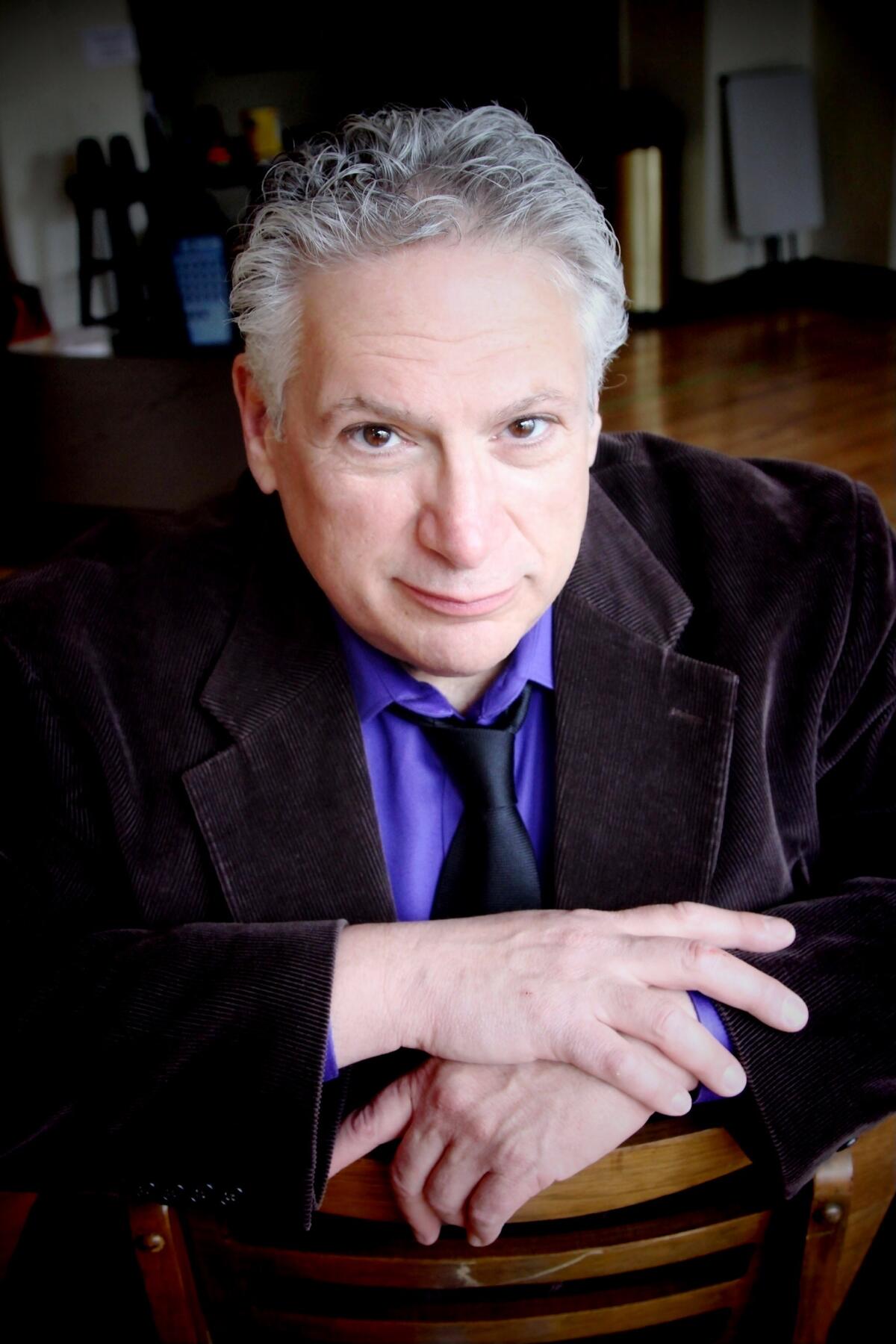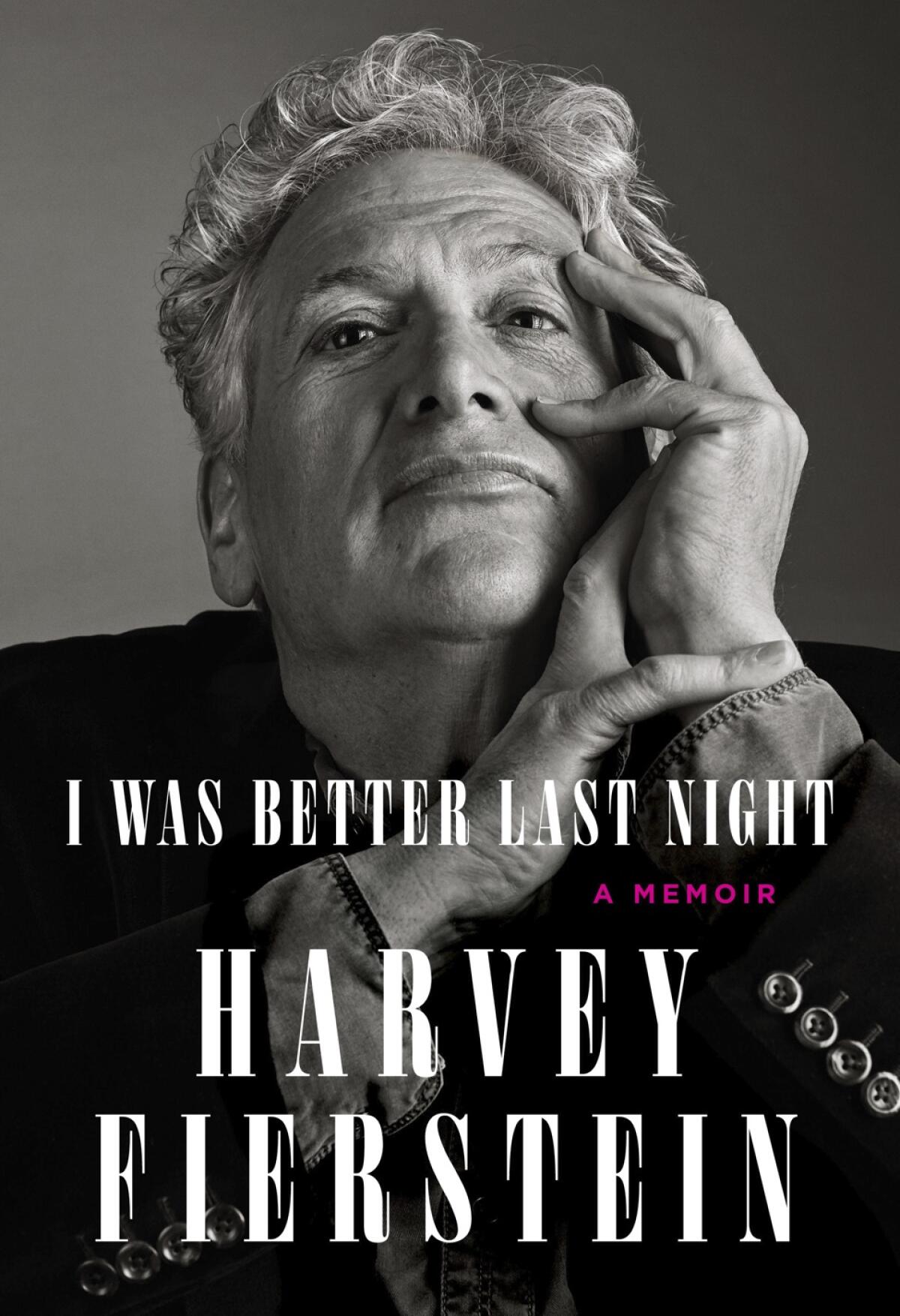Harvey Fierstein — warts, ego and all — in his juicy memoir ‘I Was Better Last Night’

On the Shelf
I Was Better Last Night: A Memoir
By Harvey Fierstein
Knopf: 400 pages, $30
If you buy books linked on our site, The Times may earn a commission from Bookshop.org, whose fees support independent bookstores.
Harvey Fierstein was born, not made. Becoming a playwright and theatrical grandee took time. But as his scrumptious new memoir, “I Was Better Last Night,” reveals, it was only a matter of time before this chubby Brooklyn boy with an itch for drag commandeered a stage.
Much of the book chronicles the period after “Torch Song Trilogy,” Fierstein’s groundbreaking gay play, transformed him into a Tony-winning writer and star. He delivers plenty of dish, some of which leaves a bitter aftertaste. But his writing is most alive in the early years, before he becomes a Broadway institution.
A natural storyteller with a yenta’s love of mischief, Fierstein paints a vivid portrait of his youth in Bensonhurst, the neighborhood made famous by “The Honeymooners” and “Saturday Night Fever.” Raised in a small, three-bedroom, semi-attached house in a Jewish enclave, he was ever-mindful of the rabbi who passed the family’s “front door at least six times a day.”
Yet gender conformity eluded him. Embarrassed by what he calls his “boy boobs,” the zaftig young Fierstein would wrap his chest in an Ace bandage before heading to school, only to draw more attention to his cleavage as his flesh slipped out of its makeshift corset. At a hotel pool, he’d put on an Esther Williams show for his nonplussed parents.
Fierstein’s adolescence revolved around the magical portal of television. The “Million Dollar Movie,” a staple of local programming, brought him into contact with his “goddesses” — Mae West, Marlene Dietrich, Bette Davis and Maria Montez among them. His comic timing was honed by watching sitcoms, especially those starring stage actors like Dick Van Dyke, whom Fierstein had seen in “Bye Bye Birdie” on one of his family’s Broadway outings.
Theater for this outer-borough son glittered like the New York skyline, distant yet accessible even for a household of modest means. But it was the visual arts that saved Fierstein from the homophobic hell of an ordinary public high school. The painting lessons his mother insisted on gained him entry to Manhattan’s High School of Art and Design, where he was finally surrounded by his own kind.
When Fierstein came out to teachers and friends, they wondered why he was making such a big deal about something so obvious. Ron, his older brother and trusted legal advisor, put it this way to a reporter: “Harvey was always Harvey. We just assumed he had it all worked out, so we accepted him as he was.”
The truth is more complicated. Fierstein saves the trauma of his coming-out story for late in the book. Without drawing a straight line, he connects his mother’s condemnation to the Broadway evangelist he would become. She eventually came around, but much of his career has been spent trying convince women like her in the audience of gay people’s humanity.
So how did an art student transform himself into the “Mayor of Broadway,” as Lesley Stahl dubbed him during the filming of a “60 Minutes” segment that never ran? With a few school friends, he signed up to make posters for a community theater in Brooklyn, which led to an acting role and then another.
He continued his art education at Pratt Institute to placate his parents. But while diving into the Greenwich Village gay scene, he fell in with the underground theater set, who appreciated his willingness to pick up a paintbrush, squeeze into a dress and plunge into the madness.

His diploma may be from Pratt, but his higher education came via the off-off-Broadway movement of the 1970s. Playwright Ronald Tavel, a founder of the Playhouse of the Ridiculous, exhorted him to write his own plays. Andy Warhol’s Factory crowd made room for his theatrical flamboyance. Ellen Stewart, founder of La MaMa Experimental Theatre Club, where “Torch Song Trilogy” was spawned, became a surrogate mother.
Fierstein doesn’t romanticize his “ramen-noodle-beginnings,” but the experimental freedom of the period was formative. (He speculates that his unmistakable croak may be a legacy of his days as an untrained performer screaming over wild theatrical shenanigans.) His account of his extensive apprenticeship brings to life a history arguably more culturally significant than his Broadway heyday.
Fierstein’s eventual success uptown alienated him from some of his downtown mentors. It wasn’t just the commercialism but the way gay politics had begun to assert itself in his work. The devastation of AIDS in the 1980s only redoubled Fierstein’s determination to use theater as a vehicle for social change. On his watch, drag went from edgy (“Torch Song Trilogy”) to mainstream (“Hairspray”), and from gay (“La Cage aux Folles”) to straight (“Kinky Boots”).
Equality was his mission — and Tonys the reward. Competition brings out the beast in him. He speculates (rather pettily) that Stephen Sondheim was chilly to him because “La Cage” has a winning track record over the maestro’s masterpieces. Much as I adored “Hairspray,” I had trouble accepting his assertion that Edna, his hausfrau character, “is now as iconic a Broadway dame as Mame, Dolly or Miss Adelaide.”
Review: ‘Kinky Boots’ is unsteady in its Broadway walk
In his telling, he rescued “Hairspray’s” book, credited to Mark O’Donnell and Thomas Meehan, from disaster. He reports that Meehan, who died in 2017, sidled up to him at a bar to complain that his only remaining line had been cut in the rewrite. “He did not remove his name,” Fierstein adds, “but he did graciously mention me when accepting both the Tony and the Drama Desk awards for writing the best book of a musical.”
Fierstein’s dings are often dressed in self-flattery. Anne Bancroft, who played the mother in the disappointing screen version of “Torch Song Trilogy,” is quoted as saying after seeing the finished film, “If I knew it was going to come out that good I would have worked harder.”
The chapter on “Kinky Boots” is curiously silent on the Broadway production’s powerhouse star, Billy Porter. But discretion is a pose Fierstein cannot maintain: “[I]t wasn’t until Wayne Brady took over the role [of Lola from Porter] that audiences finally listened to the character say that he preferred women and accepted him as a cross-dressing heterosexual.”
I feared seeing my own name in the section on “A Catered Affair.” When I panned the musical in its 2007 San Diego tryout, Fierstein called for my employer to tear up my contract. But he now acknowledges artistic missteps. And to his credit, he is often scathingly honest about himself. He writes courageously about his alcoholism, describing a period of bitter isolation in which he was drinking half a gallon of Southern Comfort a day while nursing old grievances.
Sobriety ignited a renaissance that had him at one point working simultaneously on the development of two musicals, “Kinky Boots” and “Newsies,” as well as the play “Casa Valentina.” Choosing work over wedded bliss, Fierstein comes to accept that he’s not the marrying kind: “My personality is simply too addictive. I don’t love, I obsess. I don’t share, I possess. I don’t partner, I control.”
“I Was Better Last Night” could have used more of this kind of soul-searching. The Harvey Fierstein glimpsed here is tantalizingly, defiantly, irreducibly complex. It’s a pity Sondheim isn’t around to offer the contradictory protagonist of this memoir the musical he deserves.
More to Read
Sign up for our Book Club newsletter
Get the latest news, events and more from the Los Angeles Times Book Club, and help us get L.A. reading and talking.
You may occasionally receive promotional content from the Los Angeles Times.









